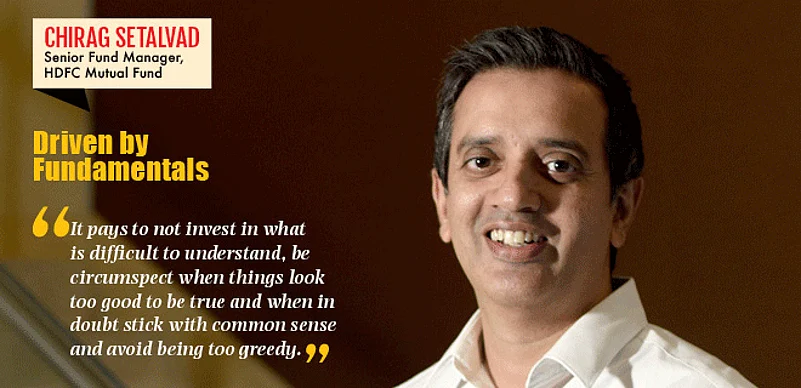For most average investors, investing their money in a fund with a proven historical track record is a good start. The simple answer to this lies in the current state of the stock markets, where the difference between the best performing and the worst performing fund is fairly narrow. The reason for such an outcome is the current bull run, when it becomes difficult to differentiate between the good and the not so good fund.
Thus, it becomes pertinent to check the fund manager’s ability to manage the downside, when it occurs and also their ability to manage a fund with bigger assets because of an increase in money flows into it. It is evident that many a times, short-term performance may be driven by luck, but in the long run, wealth creation has always been driven and heavily influenced by the fund manager's skills.
Today onwards, we will be featuring interviews of eight of the finest money managers, who have repeatedly demonstrated their superior skills with consistent returns, within the defined investment framework of the funds they manage. As you evolve as a mutual fund investor, start assessing fund managers to invest with those who have proven their skills; after all as goes the saying—form is temporary, class is permanent.
Avoid being too greedy
What approach do you practice towards investing in the fund(s) you manage?
We look to buy good quality businesses at reasonable valuations and to build the portfolio up largely on a bottom-up basis. We want to invest in businesses run by honest and competent managers and aim to stick within our circle of competence and hence avoid sectors and stocks that we cannot understand well. We want to maintain some margin of safety when buying a stock and thus would not like to overpay and avoid rich valuations. We aim to take advantage of adverse market conditions by investing more aggressively during tough times when valuations are more favorable. We also try and look at stocks at a normalised profitability level and not get carried away when profitability is either far above or far below normal or average levels. Finally, we aim to hold stocks for an extended period of time and let the power of compounding work in our favor. Equally important, we look to minimise our mistakes by avoiding businesses that we can’t understand well, where there are corporate governance issues, cash flows are weak and where capital deployment has been poor.
What is the one theme that you are bullish on now?
We don't follow a thematic or sector-based approach to investing but rather look at stock specific opportunities. However, there are a few trends or themes that are gaining credence these days. On one hand, the introduction of GST has the potential to shift market share from the unorganised to the organised sector. This could lead to higher volumes, better pricing and lower logistics costs. It is important to keep in mind that GST is just one of several variables impacting a company, apart from other factors, such as raw materials, regulation, competition etc. and of course valuations have to be considered. Besides GST, there is significant emphasis on infrastructure creation and this will create several opportunities as well.
Share one investing lesson you will never forget?
One investing lesson that I have learnt is the importance of minimising ones mistake. This business is as much about identifying future winners as it is about avoiding big losers. To do that, one has to look at long-term historical records, speak to competitors and unlisted companies, pay attention to cash flows, dividends, tax rates and disclosure levels. It pays to not invest in what is difficult to understand, be circumspect when things look too good to be true and when in doubt stick with ones common sense and avoid being too greedy.
Chirag Setalvad, Senior Fund Manager, HDFC Mutual Fund













